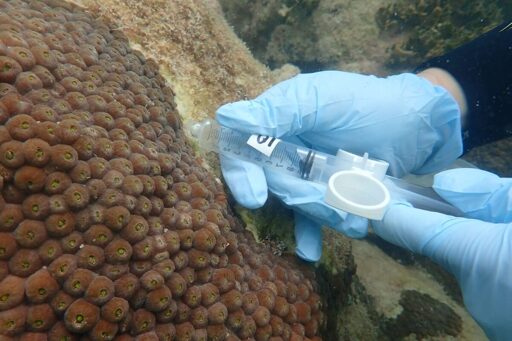A bacterial probiotic helped slow the spread of a deadly disease on great star coral, one of the largest and most resistant corals still surviving in the Florida Reef Tract, a 560-kilometer (350-mile) barrier reef off the coast of Florida, U.S., a recent study found. The treatment involved sealing live great star coral (Montaststraea cavernosa) colonies inside large, weighted plastic bags filled with a probiotic seawater solution, creating a temporary aquarium. The corals treated in this way lost an average of 7% of their tissue, compared with 35% in untreated control corals. “It’s important to understand that this is the very beginning,” lead author Kelly Pitts, a researcher at the Smithsonian Marine Station, told Mongabay by phone. “This is definitely not a cure-all, but we’re definitely moving in the right direction.” Stony coral tissue loss disease (SCTLD) has caused extensive death for more than 30 species of reef-building corals in Florida’s coral reef and is now spreading to other reefs in the Caribbean Sea. Pillar coral (Dendrogyra cylindrus), a species known for its finger-like spires, is now considered functionally extinct in Florida due to SCTLD. Other species have lost up to 97% of their colonies. Researchers had tested two delivery methods to combat its spread with probiotics: a paste and the seawater solution. Both used a bacterial strain called McH1-7, which was isolated from a healthy coral and cultivated in a lab. The paste treatment, where divers applied the probiotic directly onto infected tissue and then spread it by hand…This article was originally published on Mongabay
From Conservation news via this RSS feed


